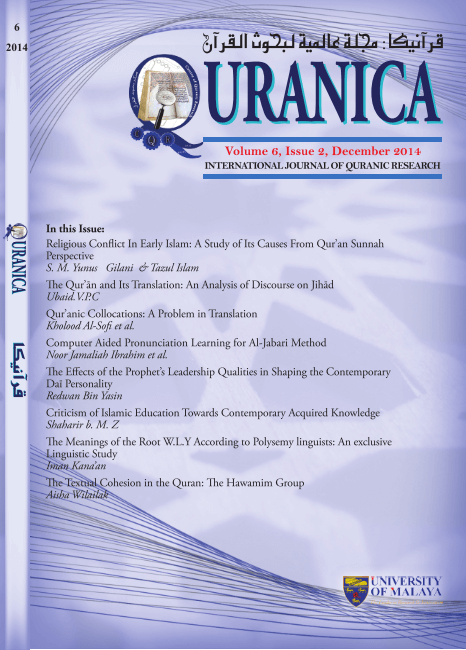The Quran and its Translation: An Analysis of Discourse on Jihad in Selected English Translations
Main Article Content
Abstract
Translation of a literary text from its original language to another requires not only great skill in both languages, but also in-depth knowledge of the background and culture as well. A scripture, particularly the Qur’ān, which proclaims itself as a linguistic marvel, presents a higher level of difficulty. The translating the Qur’ān is different from all other texts and scriptures. The Word of God cannot be presented in any human language and it is difficult to have the formal and dynamic equivalence. This paper aims to analyze the verse 9:5 of the Qur’ān which deals with the concept of Jihād and how different versions appear in the five representative English translations. The selected translations are those rendered by Yusuf Ali (apologetic and pseudo-rational), Hilali and Muhsin Khan (salafi), Abul Ala Mawdudi (traditional) Muhammad Asad (apologetic) and Tarif Khalidi (modern). Modification of the Qur’ānic terms, distortion of the syntactic structure, selection of biblical archaic lexicon, negation of the semantic coherence of the Qur’ānic verse, marginalization of important message etc. are found. They find room for accommodating their ideologies and viewpoints in their translation of the Qur’ānic verse.
Downloads
Article Details
Disclaimer
QURANICA makes every effort to ensure the accuracy of all its contents. However, opinions, discussions, views and recommendations are expressed in this journal do not necessarily reflect the official policy of QURANICA or views of its editors or publishers. Therefore, QURANICA and its publishers will not be liable for any controversy may be arisen. The journal reserves the right, at its sole discretion, to change its terms and conditions of publications.
Copyright
It is a condition of publication that manuscript submitted to the journal have not been published, accepted for publication, nor simultaneously submitted for publication elsewhere. By submitting a manuscript, the author(s) agrees that copyright for the article is transferred to the publisher, if and when the manuscript is accepted for publication.
